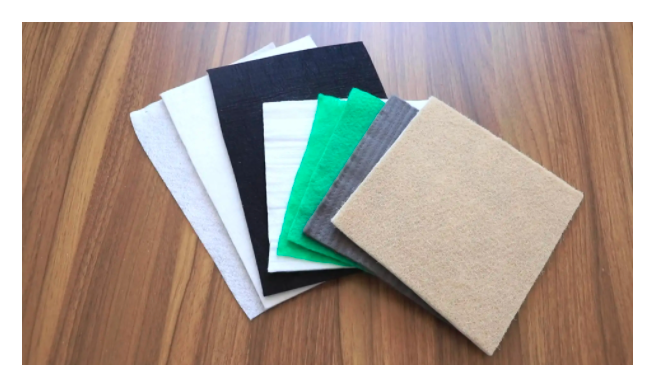- Understanding the Role of Geomembrane Liners in Waste Management
- Innovations in Geomembrane Liners for Water Management
- Geomembrane Liners: A Comprehensive Guide
- The Future of Geomembrane Liners in Civil Engineering
- Geomembrane Liners: Enhancing Landfill Stability
Manager:
WhatsApp:+86 177 0135 2670
Tel:+86 177 0135 2670
Email:marketing@okorder.com
Address:3rd Floor, No.2 Building, No.1 Sanlihe Road
Unseen Heroes in the Construction Industry: Nonwoven Geotextiles.
In this dramatic theater of construction and environmental conservation, there is an invisible hero – a silent supporter that strengthens and stabilizes our efforts. This hero is non-woven geotextile which is a plain looking fabric but it has multiple uses such as reinforcing soil structures for long-lasting roads and railways. It’s a tribute to these non woven Geotextiles that we present this article as we trace them from raw material to integral components of modern infrastructure.
The Skin Of Our Infrastructure: Introduction To Nonwoven Geotextiles
Imagine if world without support of non-woven geotextiles; our roads would be torn apart while the landscape would be vulnerable to erosion and landfills less secure. These fabrics are made from natural fibers or synthetic polymers and are unsung heroes in the built environment.
A Closer Look at The Material
Nonwoven geotextiles consist of interlocking fibers that make it look like felt when produced. This feature comes about due to its unique manufacturing process, which allows it to stretch over different surfaces while maintaining its strength.
Borderless Applications: The Role of Nonwoven Geotextiles
There is no limit for how far you can go with non woven geotextiles. These fabrics silently ensure integrity and longest lives of our projects ranging from landfill systems downward and road ways upward on rail tracks.

Road Construction Reinforcement And Drainage
With respect to road construction, on highways, these textiles act as a reinforcement layer which increase the subgrade stability while inhibiting the mixing of the subgrade with aggregate layers. Additionally, they offer drainage medium through which water moves while retaining silt particles hence preventing clogging in drainages.
Erosion Control As Well As Environmental Conservation
They are responsible for controlling erosive forces against slopes or riverbanks hence guarding them against wind or water. Land preservation in erosion control systems and promotion of vegetation growth is also possible as the plants help to keep soil in place.
Rail Road Stabilization And Landfill Protection
In railway applications, these geotextiles prevent pumping of subgrades into ballast thus maintaining a smooth and even track. In land fills, they act as a filter layer or cushion to enhance durability, life span and efficiency of waste containment systems by protecting the geomembrane from puncturing.
The Miracle Of Manufacture: Nonwoven Geotextiles Production
The process starts with the selection of raw materials which may be synthetic or natural. The manufacturing processes are a demonstration on how human inventiveness can make these materials strong fabrics that can stand up to any conditions.
From Fiber To Fabric
This nonwoven geotextile creation exercise involves carding where fibers are aligned and then mechanically bonded together through thermal or chemical means. This attests the meticulousness used in every stage of production till this fabric was obtained.
A Promise for Quality and Performance
Quality and performance standards must be met by manufacturers of non-woven geotextiles who want their products to bear testing before making it onto project sites. These measures are evident when examining at quality controllers taking place just before any batch of geotextile is released for use in construction projects.
The Future of Nonwoven Geotextiles: Innovation and Sustainability
The role of nonwoven geotextiles is predicted to increase as we look towards the future. These fabrics are set to become even more important in our construction and environmental projects due to advances in materials science and growing emphasis on sustainability.
Embracing Innovation in Material Science
Ongoing research and development in the geotextile field promises new materials with improved properties. These could comprise stronger, longer-lasting, or more eco-friendly fabrics for a wider range of applications involving nonwoven geotextiles.
Sustainability and the Role of Nonwoven Geotextiles
Modern construction is all about sustainability at its core and nonwoven geotextiles play an important part in this aspect. This helps to save nature, prevent soil erosion, protect landfills, preserve natural resources, minimize detriment on the environment etc.
In Conclusion: A Fabric Woven into the Fabric of Our Lives
Nonwovens are not just things; they are invisible partners who aid us in building today’s structures. We step on them; they guard our lands; we direct our water along their channels. In a way these textiles have tangoed with the earth, bending it to create landscapes of strength and beauty.
As we continue to innovate and push boundaries in construction and green living let us not fail to appreciate humble non-woven geotextile fabric. It is within this strength that we can find potential for our infrastructure, while flexibility will give us resilience that will help overcome tomorrow challenges The spirit of these textiles can be felt throughout Mother Earth as she silently accompanies humanity towards a better future characterized by enduringness.
- Previous:Synonyms of Geotextile Fabric: A Look at the Meaning of ‘Harga Geotextile’
- Next:The Versatility of Geotextile Non-Woven: A Deep Dive into Its Applications and Impact






